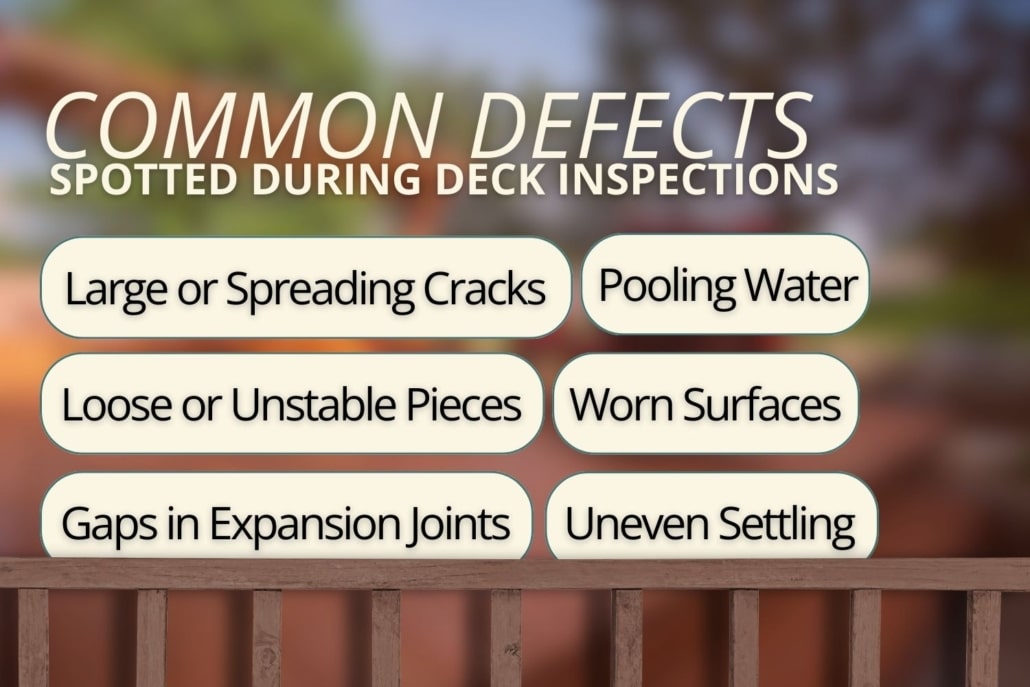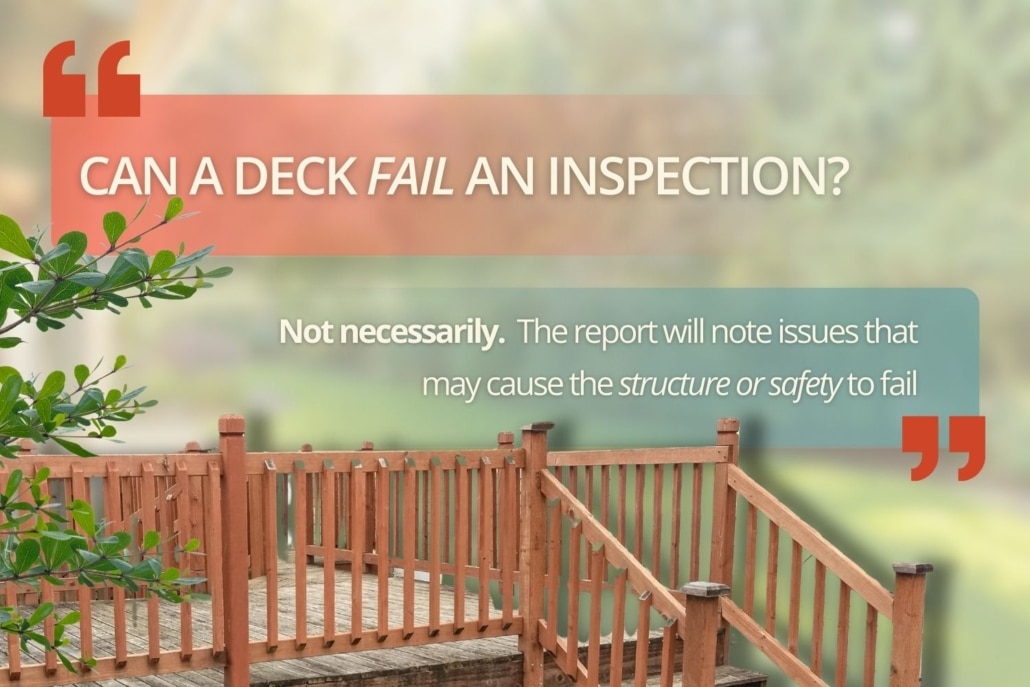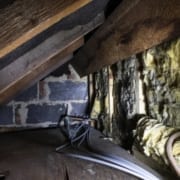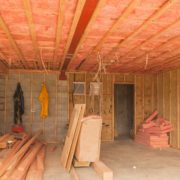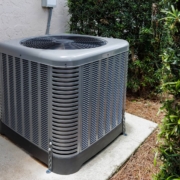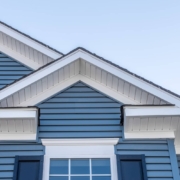Pool Deck Defects That Will Get Flagged During Inspections
In Florida, backyard pools are common. What often gets overlooked is the condition of the pool deck (the surface that surrounds the pool and supports everything from daily foot traffic to safety fencing). A deck inspection, especially in coastal and high-humidity areas like Jacksonville, is a necessary evaluation of a critical structure.
Inspectors evaluate it for safety, function, and long-term durability. Cracks, drainage issues, loose tiles, or shifting surfaces can all be red flags that affect your home’s value or even your ability to close on a sale.
This guide breaks down the most common deck defects that inspectors call out, why they matter, and what homeowners and buyers need to know before moving forward.
Why Inspectors Look Closely at the Pool Deck
Pool decks aren’t just decorative. They support safe movement around the pool, provide slope for water drainage, and help protect both the pool and the home from water damage.
In fact, the Consumer Product Safety Commission (CPSC) reports that poolside surfaces are among the most common areas for slips, trips, and falls in residential environments. That’s one reason many insurers require home inspectors to assess pool deck safety and stability before writing or renewing a policy.
During a home inspection, pool deck defects may be flagged as:
- Safety hazards
- Structural concerns
- Drainage issues
- Deferred maintenance or cosmetic defects
While not all of these will affect the final sale or coverage, they can point to deeper problems that need to be addressed.
Common Defects Found During Deck Inspections
1. Large or Spreading Cracks
Small, surface-level cracks are normal over time, especially in concrete. However, wide, uneven, or branching cracks can be signs of structural shifting or poor installation. These often indicate:
- Soil settlement under the deck
- Water erosion from poor drainage
- Lack of proper expansion joints
Inspectors will note the width and direction of cracks and may recommend further evaluation if they appear to compromise the surface.
2. Loose or Unstable Pieces
In wooden or paver-style pool decks, each block must rest securely on a level, compacted base. If the base erodes or settles unevenly, the pavers can become loose or wobbly. These present trip risks and may shift further with foot traffic or rain.
3. Pooling Water
Decks are designed to slope away from the pool and home, guiding water into drains or grassy areas. If water is collecting on the surface or near the foundation, it could mean:
- Improper deck slope
- Clogged or missing drains
- Sinking areas due to subsurface erosion
Over time, this water can weaken the deck, promote mold or algae growth, and damage nearby structures.
4. Worn or Slippery Surfaces
Florida’s humidity and UV exposure can wear down deck coatings, especially if they aren’t sealed regularly. Algae, mildew, or faded textures can lead to slip hazards. If the deck is visibly slick or patchy, inspectors will note it as a safety concern.
5. Gaps Between the Deck and Nearby Structures
There should be a flexible expansion joint between the pool shell (or the home) and the surrounding deck. If that joint is cracked, missing, or filled with debris, it allows water to seep below the structure. This can cause the deck to shift or damage the pool wall.
6. Uneven Deck Settling
Deck sections that appear sunken or tilted can result from:
- Eroded or washed-out soil
- Tree roots underneath the deck
- Failed installation techniques
In Florida, sandy soils and summer downpours increase the risk of soil movement under slab and paver decks. Inspectors use levels or visual grading to assess any pitch changes.
Florida-Specific Factors That Contribute to Deck Damage
Jacksonville and other Northeast Florida areas face environmental conditions that accelerate pool deck wear:
- High humidity: Speeds up algae growth and surface decay
- Frequent rainfall: Contributes to erosion, especially around improperly graded decks
- Sandy soil: Drains quickly but does not compact well, which can lead to shifting or sinking
- Tree root systems: Common around pool areas and capable of lifting pavers or cracking slabs
According to NOAA weather data, Jacksonville averages an average annual rainfall of more than 50 inches. This makes regular deck inspection and drainage management a necessity, not a luxury.
What These Defects Can Mean for Buyers and Sellers
Buyers:
A flagged pool deck may not kill a sale, but it can raise concerns about future repair costs. If drainage issues or structural damage are suspected, your inspector may recommend additional evaluations or negotiations for credit at closing.
Sellers:
Visible damage or safety hazards could slow down the transaction or attract lower offers. You may be asked to complete repairs before closing or document recent improvements.
Homeowners keeping the property:
Deck repairs left unresolved will only worsen with time. Cracks widen, surfaces become more slippery, and drainage issues can impact both the pool and nearby structures. An inspection gives you a chance to fix issues before they escalate.
Other Related Questions
What will a home inspector look for on the pool deck?
A licensed home inspector checks the pool deck for cracks, drainage issues, uneven settling, loose pavers, slippery surfaces, and gaps around the pool’s edge.
How often should I inspect my deck for problems?
Visually inspect it seasonally and after heavy rains. Watch for new cracks, loose sections, or soft spots near the edge.
Does a home inspector check the pool system too?
Some do, but others exclude pool equipment unless requested. Always confirm whether your inspection covers the full pool area or just the structural elements like the deck and enclosure.
When to Call a Professional
If you see signs of damage, drainage failure, or uneven settling around your pool, don’t wait. Whether you’re planning to list your home or just trying to prevent costly repairs, early evaluation matters.
Inside & Out Property Inspectors offers:
- Full pool deck evaluations during home inspections
- Same-day digital reports with clear documentation
- Local experience with Northeast Florida soils, weather, and permitting
- Recommendations for repairs and next steps
Licensed inspectors know how to spot red flags before they become liabilities and can give you the insight you need to take action.
Conclusion
Your pool may be the centerpiece of your backyard, but the deck is what holds everything together. It impacts safety, drainage, and long-term value. Whether you’re buying, selling, or staying put, pool deck defects are something you can’t afford to ignore.
From cracking and shifting to standing water and worn surfaces, these problems are common in Florida homes. A thorough inspection from Inside & Out Property Inspectors helps you catch them early, make informed decisions, and keep your home safe and sound for the long run.

